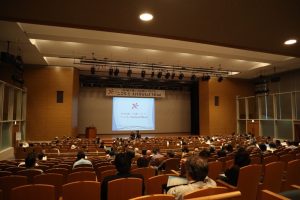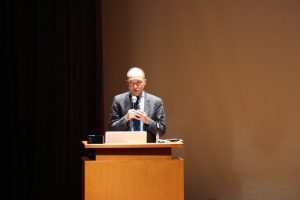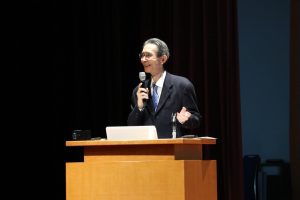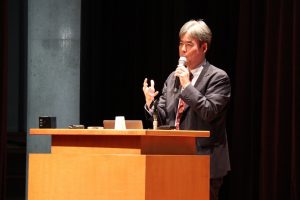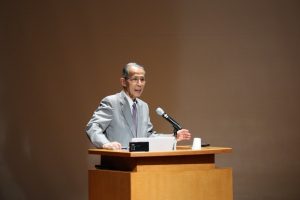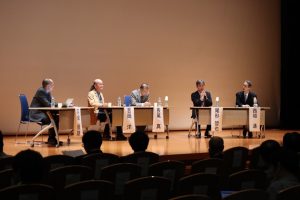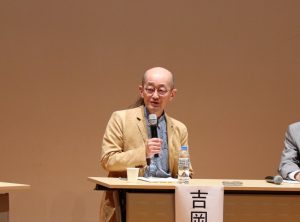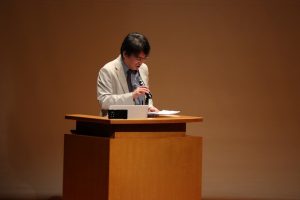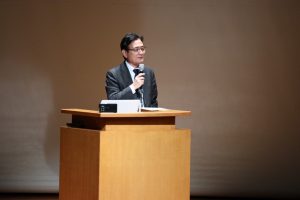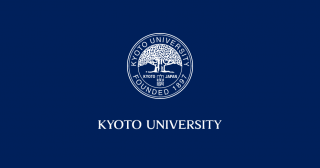On 14 October 2019, Kokoro Research Center (KRC) hosted a symposium, "Kokoro and the Artificial Mind", at the Clock Tower Centennial Hall. It was the fifth conference to be held under the Kyoto Kokoro Initiative (KKI), launched in 2015 with support from the Inamori Foundation. The previous four KKI symposia were entitled "Kokoro and Historicity", "In and Out of Kokoro", "Kokoro and Symbiosis" (the first international event), and "Kokoro and Ways of Life: What is the Self?". The word kokoro means mind, spirit, soul, or psyche.
With approximately 260 people attending, the 14 October symposium opened with remarks from KRC Director Toshio Kawai, who was introduced by the emcee, KRC Vice Director Yoshinori Hiroi.
The program featured lectures by three renowned computer scientists. The first was by University of Tokyo Professor Emeritus Toru Nishigaki, an informatics expert, who spoke on "The Future of Kokoro in the AI Era". Focusing on the moral aspects of artificial intelligence, he suggested that unlike humans, AI lacks biological autonomy and therefore cannot be held accountable for the outcome of its actions. He also urged greater awareness of the risks and limitations of AI implementation.
The next speaker was Dr Tetsuya Ogata, a professor of engineering at Waseda University and a joint appointed fellow at the Artificial Intelligence Research Center of the National Institute of Advanced Industrial Science and Technology (AIST). His lecture, entitled "Sensory-Motor Learning by Deep Neural Networks: From the Viewpoint of Cognitive Developmental Robotics", described how robots can learn to handle new tasks using a deep learning algorithm developed by his team, and highlighted the unpredictable nature of the learning process involved. Professor Ogata concluded by emphasizing the importance of acknowledging this unpredictability in seeking to further develop and expand the application of the technology.
The third and final lecture was "Building a Model of Kokoro" by KyotoU Professor Emeritus Makoto Nagao, a Japanese pioneer of informatics. He explored the possibility of replicating the human mind as a computer program based on a three-part model of brain functions, consisting of intelligence, mind, and soul (or vitality). He explained that of the three, the mind functions would be the most difficult to emulate, but suggested that some form of artificial mind, one capable of at least some of these functions, could be realized in the near future.
The three speakers then joined KRC Professor Hiroshi Yoshioka in a panel discussion, moderated by Director Kawai. The session included an extensive discussion of the idea of AI-created artwork, and examined the differences between humans and computers in terms of creativity and aesthetic perception.
The symposium closed with remarks from Dr Nagahiro Minato, Kyoto University's provost and executive vice-president for strategy coordination, research, planning, and hospital administration. He commented on the growing use of AI and deep learning in the field of medicine, and stressed the need to continuously explore how to relate to these technologies.
Extended presentation summaries:
- Toru Nishigaki, "The Future of Kokoro in the AI Era"
- Tetsuya Ogata, "Sensory-Motor Learning by Deep Neural Networks: From the Viewpoint of Cognitive Developmental Robotics"
- Makoto Nagao, "Building a Model of Kokoro"
